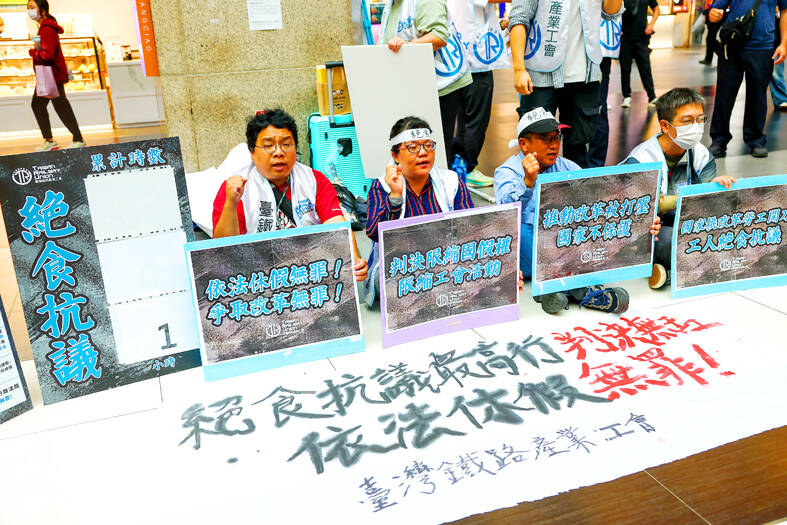Members of the Taiwan Railway Union yesterday went on a 100-hour hunger strike at the Taipei Railway Station after the Supreme Administrative Court ruled in favor of Taiwan Railway Corp (TRC) in a case regarding a union protest in 2017.
Union members during the Lunar New Year holiday in 2017 protested to oppose overwork and demand better working conditions, during which they did not come to work. Although the protest was framed as workers exercising their right to take leave, it effectively functioned as a quasi-strike, disrupting train services nationwide.
The protest led to the TRC revising the work shift system, and increasing workers’ salaries and benefits. However, the union later filed a lawsuit against the company and the Ministry of Labor after 337 workers were marked with “unauthorized absences” for taking leave during the holiday.

Photo: CNA
The Taipei High Administrative Court ruled in favor of the union, but the Supreme Administrative Court reversed the ruling and ruled in favor of the TRC and labor ministry.
The union said the purpose of the hunger strike, which is to last until Monday, is to demonstrate that the Supreme Administrative Court’s ruling is unreasonable, adding that it is considering requesting a retrial.
“All reforms that the TRC implemented were results of the workers’ protests. The railway company has never actively addressed the workers’ demands for better working conditions,” union Secretary-General Chu Chih-yu (朱智宇) told a news conference at the Taipei Railway Station.
“The ruling from the Supreme Administrative Court not only determined the legality of he punishment for the TRC employees who joined the union’s protest, but would also affect the rights of all workers in Taiwan taking leave on national holidays,” Chu said. “The judicial remedy is not yet over. Workers that have been united in this cause will not bend their knees to the employer simply because of a court ruling.”
“The union will defend workers’ right to take leave until the end,” Chu said.
Other labor groups supporting the union’s hunger strike also vowed to unite workers’ unions across the nation for a larger protest.
The union said the core issue in the case was whether workers’ unions need to operate within the confines of company procedures during a labor dispute.
The Taipei High Administrative Court ruled in favor of the union, as the committee that determined that the TRC did not engage in unfair labor practices reached the decision without fulfilling the quorum for a meeting.
The TRC and the labor ministry appealed the ruling, and the case was retried.
The union won the retrial, with the court finding that the TRC engaged in unfair labor practices by not obtaining workers’ consent before arranging holiday work schedules and for marking them absent.
However, the Supreme Administrative Court said that the TRC’s regulations authorized the company to arrange workers’ schedules on weekdays and national holidays, so their actions did not contravene the Labor Standards Act (勞動基準法).
TRC’s procedures for employees taking paid leave or leave of absence were not designed to impose unreasonable restrictions on workers, but are meant to apply consistent rules to all employees when they arrange their leave schedules, it said.
The Supreme Administrative Court said that although it acknowledged the union’s right to not settle disputes through established mechanisms, union members did not act according to the terms of their contracts and did not follow the “good faith” principle.
Therefore, TRC’s response to workers taking leave without permission did not constitute an unfair labor practice, the court said.

The manufacture of the remaining 28 M1A2T Abrams tanks Taiwan purchased from the US has recently been completed, and they are expected to be delivered within the next one to two months, a source said yesterday. The Ministry of National Defense is arranging cargo ships to transport the tanks to Taiwan as soon as possible, said the source, who is familiar with the matter. The estimated arrival time ranges from late this month to early next month, the source said. The 28 Abrams tanks make up the third and final batch of a total of 108 tanks, valued at about NT$40.5 billion

A group from the Taiwanese Designers in Australia association yesterday represented Taiwan at the Midsumma Pride March in Melbourne. The march, held in the St. Kilda suburb, is the city’s largest LGBTQIA+ parade and the flagship event of the annual Midsumma Festival. It attracted more than 45,000 spectators who supported the 400 groups and 10,000 marchers that participated this year, the association said. Taiwanese Designers said they organized a team to march for Taiwan this year, joining politicians, government agencies, professionals and community organizations in showing support for LGBTQIA+ people and diverse communities. As the first country in Asia to legalize same-sex

MOTIVES QUESTIONED The PLA considers Xi’s policies toward Taiwan to be driven by personal considerations rather than military assessment, the Epoch Times reports Chinese President Xi Jinping’s (習近平) latest purge of the Chinese People’s Liberation Army (PLA) leadership might have been prompted by the military’s opposition to plans of invading Taiwan, the Epoch Times said. The Chinese military opposes waging war against Taiwan by a large consensus, putting it at odds with Xi’s vision, the Falun Gong-affiliated daily said in a report on Thursday, citing anonymous sources with insight into the PLA’s inner workings. The opposition is not the opinion of a few generals, but a widely shared view among the PLA cadre, the Epoch Times cited them as saying. “Chinese forces know full well that

An elderly man with underlying health conditions died in mid-January, eight days after the onset of symptoms, marking Taiwan’s first hantavirus death this year, the Centers for Disease Control (CDC) said yesterday. The man, who was in his 70s and lived in Taipei’s Daan District (大安), tested positive posthumously for hantavirus after passing away on Jan. 13 from sepsis complicated by multiple organ failure and pneumonia, the CDC said in a press release. According to the CDC, the man sought treatment on Jan. 6 for respiratory issues and low blood pressure before returning two